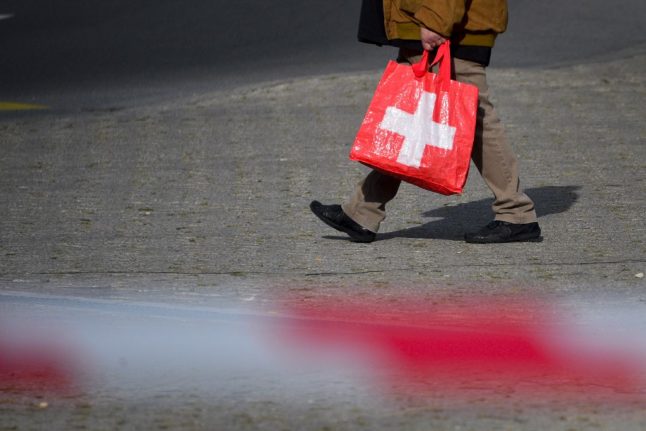Swiss cantons step up efforts for Sunday shopping - but will they succeed?

Many foreign residents cite the fact that shops are closed on Sundays as one of the most annoying aspects of living in Switzerland. But is it likely to change?
The debate over Sunday shopping is not new — it has been on-going in Switzerland for quite a while.
However, not much progress has been made to date and the rules remain pretty much the same: stores can open from Monday to Friday between 6 am and 9 pm, and on Saturdays until 6 pm.
The law does, however, allow some flexibility — for instance, small ‘convenience’ shops at petrol and train stations can open their doors on a Sunday. Stores are also open at airports (even though there are only three in Switzerland).
Additionally, certain popular tourist areas are exempted from the no-shopping rule as well. However, mostly mountain resorts have benefited from this exemption so far.
Why isn’t Sunday shopping allowed?
While in the past the reason was that Sunday should be a day of worship, not work, this is no longer the main reason.
With time, the religious aspect has diminished and trade unions have stepped up their campaign against Sunday shop openings on the grounds that they prevent retail personnel from enjoying a day of rest spent with their families.
For instance, Switzerland’s largest labour group, the Swiss Federation of Trade Unions (UNIA), argues that "it is not acceptable to subject humans to the pursuit of profit by forcing them to work seven days a week in sectors where it is not essential".
READ ALSO: Why is everything in Switzerland closed on Sundays - and what can you do instead?
However, several cantons are continuing to put pressure on politicians to loosen the current legislation.
As Watson news platform reported on Tuesday, Zurich and Geneva, along with Ticino and Lucerne, have asked the Federal Council to permit more Sunday shopping in parts of these cantons that have a particularly high tourist traffic.
They argue that in places where "tourism is essential” to the economy, shops should stay open on Sundays.
According to Watson, Economy Minister Guy Parmelin and State Secretariat for Economic Affairs (SECO) “support this idea, but their discussions with the social partners are complicated.”
“Social partners” is a reference to labour unions, which continue to oppose any change to the current law.

Photo by Fabrice COFFRINI / AFP
UNIA is firm in its position that working on Sundays “would cause more stress among staff, harm health, and impact the balance between work and private life".
Therefore, the union continues to be “fundamentally opposed to an extension of store opening hours and more sales on Sundays,” said its spokesperson, Elisabeth Fannin.
She added that "there are enough possibilities already to cover the needs of tourist regions".
Zurich and Geneva, which are at the forefront of the fight to amend the law, are not giving up their efforts, however.
Zurich is preparing a draft amendment to the law, which calls for “attractive tourist centres,” such as the city’s Old Town district, to be able to open their shops on Sundays.
In Geneva, the rue du Rhône and rue du Marché could benefit from more flexible opening hours as well.
Just how realistic are those efforts?
In Switzerland, labour law is the responsibility of the federal government, while store opening hours are set by individual cantons — a dual system that doesn’t lend itself easily to quick changes.
As the news site Watson pointed out, "nothing will really change as long as [Economy Minister] Parmelin has not created the legal conditions necessary for staff to be employed on Sundays in tourist areas".
But “will he dare to confront the unions?”
That remains to be seen.
Comments
See Also
The debate over Sunday shopping is not new — it has been on-going in Switzerland for quite a while.
However, not much progress has been made to date and the rules remain pretty much the same: stores can open from Monday to Friday between 6 am and 9 pm, and on Saturdays until 6 pm.
The law does, however, allow some flexibility — for instance, small ‘convenience’ shops at petrol and train stations can open their doors on a Sunday. Stores are also open at airports (even though there are only three in Switzerland).
Additionally, certain popular tourist areas are exempted from the no-shopping rule as well. However, mostly mountain resorts have benefited from this exemption so far.
Why isn’t Sunday shopping allowed?
While in the past the reason was that Sunday should be a day of worship, not work, this is no longer the main reason.
With time, the religious aspect has diminished and trade unions have stepped up their campaign against Sunday shop openings on the grounds that they prevent retail personnel from enjoying a day of rest spent with their families.
For instance, Switzerland’s largest labour group, the Swiss Federation of Trade Unions (UNIA), argues that "it is not acceptable to subject humans to the pursuit of profit by forcing them to work seven days a week in sectors where it is not essential".
READ ALSO: Why is everything in Switzerland closed on Sundays - and what can you do instead?
However, several cantons are continuing to put pressure on politicians to loosen the current legislation.
As Watson news platform reported on Tuesday, Zurich and Geneva, along with Ticino and Lucerne, have asked the Federal Council to permit more Sunday shopping in parts of these cantons that have a particularly high tourist traffic.
They argue that in places where "tourism is essential” to the economy, shops should stay open on Sundays.
According to Watson, Economy Minister Guy Parmelin and State Secretariat for Economic Affairs (SECO) “support this idea, but their discussions with the social partners are complicated.”
“Social partners” is a reference to labour unions, which continue to oppose any change to the current law.

UNIA is firm in its position that working on Sundays “would cause more stress among staff, harm health, and impact the balance between work and private life".
Therefore, the union continues to be “fundamentally opposed to an extension of store opening hours and more sales on Sundays,” said its spokesperson, Elisabeth Fannin.
She added that "there are enough possibilities already to cover the needs of tourist regions".
Zurich and Geneva, which are at the forefront of the fight to amend the law, are not giving up their efforts, however.
Zurich is preparing a draft amendment to the law, which calls for “attractive tourist centres,” such as the city’s Old Town district, to be able to open their shops on Sundays.
In Geneva, the rue du Rhône and rue du Marché could benefit from more flexible opening hours as well.
Just how realistic are those efforts?
In Switzerland, labour law is the responsibility of the federal government, while store opening hours are set by individual cantons — a dual system that doesn’t lend itself easily to quick changes.
As the news site Watson pointed out, "nothing will really change as long as [Economy Minister] Parmelin has not created the legal conditions necessary for staff to be employed on Sundays in tourist areas".
But “will he dare to confront the unions?”
That remains to be seen.
Join the conversation in our comments section below. Share your own views and experience and if you have a question or suggestion for our journalists then email us at [email protected].
Please keep comments civil, constructive and on topic – and make sure to read our terms of use before getting involved.
Please log in here to leave a comment.